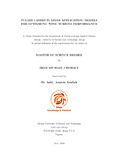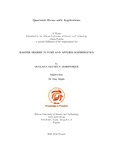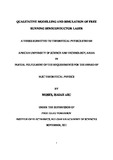Browsing by Title
Now showing items 3392-3411 of 4783
-
PSUDOC - A Simple Diagnostic Program
(MIT Artificial Intelligence Laboratory, 1976-12)This paper describes PSUDOC, a very simple LISP program to carry out some medical diagnosis tasks. The program's domain is a subset of clinical medicine characterized by patients presenting with edema and/or hematuria. The ...
-
A Publish-Subscribe Implementation of Network Management
(2013-06-04)As modern networks become highly integrated, heterogeneous, and experience exponential growth, the task of network management becomes increasingly unmanageable for network administrators and designers. The Knowledge Plane ...
-
Pulsed Lasers in Lidar Application: Models for Optimizing Wind Turbine Performance
(2019-06-22)Since the appearance of the first wind turbines at the end of the nineteenth century, wind energy has been considered to be a renewable energy source for not just developed countries but also developing countries as well. ...
-
Puma/Cougar Implementor's Guide
(MIT Artificial Intelligence Laboratory, 1985-04)This document is intended to be a guide to assist a programmer in modifying or extending the Lisp Puma system, the Puma PDP-11 system, or the Cougar PDP-11 system. It consists mostly of short descriptions or hints, and is ...
-
Pyramid Match Kernels: Discriminative Classification with Sets of Image Features
(2005-03-17)Discriminative learning is challenging when examples are setsof local image features, and the sets vary in cardinality and lackany sort of meaningful ordering. Kernel-based classificationmethods can learn complex decision ...
-
Pyramid Match Kernels: Discriminative Classification with Sets of Image Features (version 2)
(2006-03-18)Discriminative learning is challenging when examples are sets of features, and the sets vary in cardinality and lack any sort of meaningful ordering. Kernel-based classification methods can learn complex decision boundaries, ...
-
Q&A: Robotics as a tool to understand the brain
(2010-07-23)
-
Quadratic differentials as stability conditions
(SpringerPublications mathématiques de l'IHÉS, 2014)We prove that moduli spaces of meromorphic quadratic differentials with simple zeroes on compact Riemann surfaces can be identified with spaces of stability conditions on a class of CY3 triangulated categories defined using ...
-
Quadratic differentials as stability conditions
(SpringerPublications mathématiques de l'IHÉS, 2014)We prove that moduli spaces of meromorphic quadratic differentials with simple zeroes on compact Riemann surfaces can be identified with spaces of stability conditions on a class of CY3 triangulated categories defined using ...
-
Quadratic forms with Applications
(2013-05-27)The scope of Quadratic Form Theory is historically wide although it usually appears almost as an afterthought when needed to solve a variety of problems such as the classification of Hessian matrices in finite dimensional ...
-
The Quadric Reference Surface: Theory and Applications
(1994-06-01)The conceptual component of this work is about "reference surfaces'' which are the dual of reference frames often used for shape representation purposes. The theoretical component of this work involves the question ...
-
Qualitative Analysis of MOS Circuits
(1984-07-01)With the push towards sub-micron technology, transistor models have become increasingly complex. The number of components in integrated circuits has forced designer's efforts and skills towards higher levels of design. ...
-
Qualitative and Quantitative Knowledge in Classical Mechanics
(1975-12-01)This thesis investigates what knowledge is necessary to solve mechanics problems. A program NEWTON is described which understands and solves problems in mechanics mini-world of objects moving on surfaces. Facts and ...
-
Qualitative Depth and Shape from Stereo, in Agreement with Psychophysical Evidendence
(1987-12-01)Obtaining exact depth from binocular disparities is hard if camera calibration is needed. We will show that qualitative depth information can be obtained from stereo disparities with almost no computations and with ...
-
Qualitative Knowledge, Casual Reasoning and the Localization of Failures
(1976-11-01)This report investigates some techinques appropriate to representing the knowledge necessary for understanding a class of electronic machines -- radio receivers. A computational performance model - WATSON - is presented. ...
-
Qualitative Knowledge, Causal Reasoning, and the Localization of Failures
(MIT Artificial Intelligence Laboratory, 1974-03)A research program is proposed, the goal of which is a computer system that embodies the knowledge and methodology of a competent radio repairman.
-
Qualitative Modelling And Simulation Of Free Running Semiconductor Laser
(2011-11-23)The thesis presents the modelling and simulation of free running semiconductor laser. The rate equations which were derived on the basis of the fact that there must be a balance between carriers that undergo transition and ...
-
Qualitative Modelling and Simulation of Free Running Semiconductor Laser
(2011-11-15)The thesis presents the modelling and simulation of free running semiconductor laser. The rate equations which were derived on the basis of the fact that there must be a balance between carriers that undergo transition ...
-
Qualitative Process Theory
(1983-05-01)Things move, collide, flow, bend, heat up, cool down, stretch, break and boil. These and other things that happen to cause changes in objects over time are intuitively characterized as processes. To understand common ...
-
Qualitative Process Theory
(1984-07-01)Objects move, collide, flow, bend, heat up, cool down, stretch, compress and boil. These and other things that cause changes in objects over time are intuitively characterized as processes. To understand common sense ...




